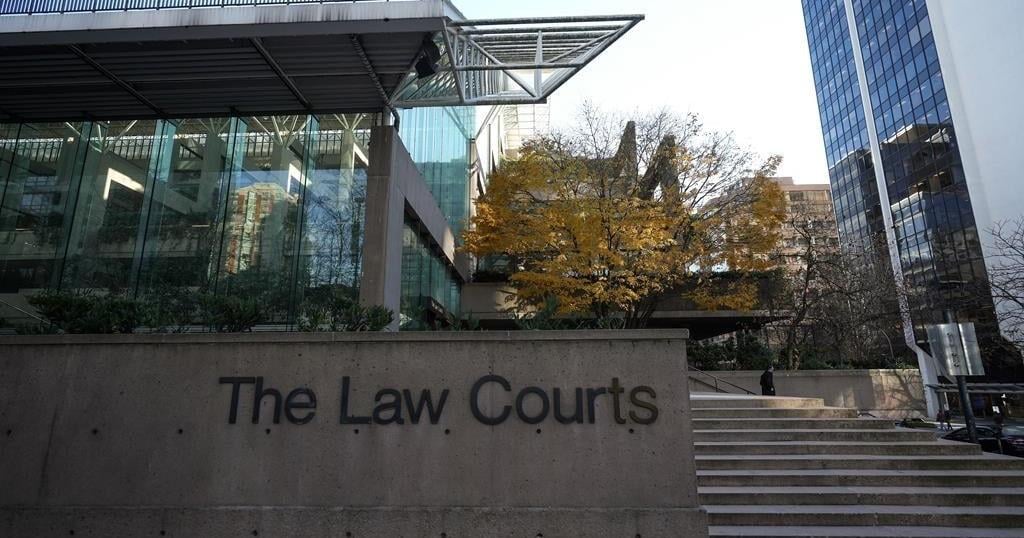VANCOUVER – A British Columbia judge has granted an urgent injunction stopping a woman’s medically assisted death, the day before it was scheduled to take place in Vancouver.
The injunction granted on Saturday to the woman’s common-law partner prevents Dr. Ellen Wiebe or any other medical professional from helping end the life of the 53-year-old Alberta woman within 30 days.
The judge’s ruling says the woman appears to have a mental health condition with no physical ailment.
The B.C. Supreme Court application for the injunction says that after she was denied medical assistance in dying, or MAID, in her home province, she found Wiebe in Vancouver.
It says Wiebe approved MAID on her first meeting with the woman, without consulting the patient’s other doctors.
Justice Simon R. Coval said on Sunday in his reasons for granting the injunction that it was “clearly a situation of extreme irreparable harm” to both the woman and her partner if the injunction was not granted before she was scheduled to die on Oct. 27.
He said there were “extremely pressing circumstances,” and a serious question about “whether there should be judicial oversight” when someone chooses to die by MAID.
Coval said he recognized the injunction “is a severe intrusion into (the woman’s) personal and medical autonomy.”
“I can only imagine the pain she has been experiencing and I recognize that this injunction will likely make that worse,” he said.
Coval said there is an “arguable case” about whether the MAID criteria were properly applied to the woman.
“As I’ve said, the evidence suggests (her) situation appears to be a mental health condition or illness without a link to any physical condition and it may not only be remediable, but remediable relatively quickly,” he said.
The woman and her partner have been granted anonymity by the court.
The application says the woman was diagnosed with bipolar disorder and later became convinced she had akathisia — an inability to sit still that is linked to certain types of medication — and began exploring medical assistance in dying.
“At the same time, (she) continued to express her desire to die. She did not want to do it herself, and regularly begged the plaintiff to end her life,” the application said.
It said two practitioners with expertise in the condition told her it was treatable, transitory and manageable, and if she followed their recommendations, “her akathisia could resolve within two to six months.”
The document claims she did not exhaust all medical treatments and was unable to obtain approval for assistance to die in Alberta.
The application says Wiebe did not try to consult with the woman’s treating physicians and “relied solely on the information provided” by the woman.
It also says the woman could not find an independent witness for the authorization form, or a second person to authorize MAID so Wiebe provided both.
Medically assisted death in Canada is only currently legal for people on the basis of a physical health condition.
Applicants whose medical condition is mental illness will remain ineligible until at least March 2027.
The application says Wiebe breached her statutory duty by approving assistance in dying for a condition that does not qualify, while failing to review the patient’s medical history or conduct a full health assessment.
None of the allegations have been proven in court and Wiebe declined a request for comment by The Canadian Press.
Wiebe was interviewed for a BBC documentary that screened this year, telling an interviewer that she had been involved with more than 400 MAID deaths.
She said there were situations “where I find someone not eligible or eligible when another person won’t, because of the way our law is written.”
Wiebe told the BBC the “No. 1 reason” people wanted MAID was to maintain “autonomy and control.”
The B.C. Supreme Court application names the woman, Wiebe and her clinic as defendants.
It had sought a permanent injunction against MAID for the woman, or a 30-day injunction in the alternative, as well as a declaration the woman does not qualify for MAID, and damages.
The applicant’s lawyer did not immediately respond to voicemails left with her firm.
This report by The Canadian Press was first published Oct. 30, 2024.
